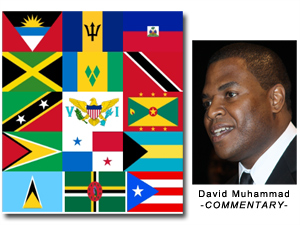CARICOM’s “10 Point Program” for Reparations for Slavery for African People
By David Muhammad -Guest Columnist- | Last updated: May 9, 2014 - 11:58:07 AMWhat's your opinion on this article?

|
It is a radical situation that requires a radical solution. We must speak for the dead who cannot speak, the living who have no voice and the unborn generations who are yet to speak. The Minister said in regards to the call for Reparations that “the Caribbean is strong and we need to back the Caribbean.” Those who sell out our community must feel the wrath of the common man because nothing is more important than the liberation of our people. We must be wary of the slave makers, the slave masters and the collaborators. No man can serve two masters, division is likely to come before justice in the struggle for reparatory justice.
The Minister closed saying “the Caribbean again comes to the fore ... we owe a debt to the Caribbean and we are a family. ... .”
We are currently at a turning point in the history of the Caribbean as across the region in 2014, there are a number of forums, conferences and seminars being hosted discussing the new “CARICOM 10 POINT PROGRAM FOR REPARATIONS FOR AFRICAN SLAVERY.” This list of demands collectively agreed upon by our various heads of government must be known by our younger generations so that they can each become a part of this growing struggle for justice. But before we look at the ten points we must give credit to Trinidad & Tobago’s own father of the nation and first Prime Minister, Dr. Eric Williams, who in his writing established an academic rationale for reparations as far back as the 1950s. In the preface of “Capitalism & Slavery,” Dr. Williams said, “Negro slavery provided the capital which financed the industrial revolution … ” this was the basis for the advancement and growth of modern technology, the computer revolution and globalization which includes the establishment of futuristic, scientific findings in modern and material solutions for many of man’s challenges. Dr. Williams elaborated by pointing out four significant facts:
- The forces in the history of slavery are linked to the developing economic forces in Europe
- The merchants, industrialists and politicians, were blind to the consequences of their actions and policies
- Political and moral ideas must be examined in relation to economic development
- The ideas built on these interests continue long after the interests have been destroyed.
The main fact is that if Africans were not abducted against their will and made into slaves, England and America would not have been as economically strong and mighty as they are today.
So on March 11, 2014 the meeting of CARICOM nations in St. Vincent and the Grenadines approved unanimously the ten-point plan proposed by the CARICOM Reparations Commission to achieve reparatory justice for the victims of genocide, slavery, slave trading, and racial apartheid. Sir Hilary Beckles, the Chairman of the Commission, said: “Reparations for slavery, and the century of racial apartheid that replaced it into the 1950s, resonate as a popular right today in Caribbean communities because of the persistent harm and suffering linked to the crimes against humanity under colonialism.” The template of the plan is as follows:
- Full Formal Apology
- Repatriation
- Indigenous Peoples Development Program
- Cultural Institutions
- Public Health Crisis
- Illiteracy Eradication
- African Knowledge Program
- Psychological Rehabilitation
- Technology Transfer
- Debt Cancellation
Martyn Day, from law firm Leigh Day and who is advising the commission, said, “This is a very comprehensive and fair set of demands on the governments whose countries grew rich at the expense of those regions whose human wealth was stolen from them … a conference in London between representatives of CARICOM and the slave nations, to include the Governments of Holland, UK, France, Spain as well as potentially other nations who profited from the slave trade, will enable our people to quickly gauge whether or not their concerns are being taken seriously.” It must also be noted that one of the earliest, if not the first, public documented and published organizational calls for reparations was from the Honorable Elijah Muhammad going back to the 1950s in the declaration; “What the Muslims Want,” Point Number 4, which read; “We want our people who are descendants from slaves to be allowed, to establish a separate state or territory of their own … ” Also the largest known forum on Reparations to date was hosted by Minister Farrakhan and the Nation of Islam on February 24, 2004 where 10,000 attended the gathering in Chicago, Ill., to hear the Minister speak on the topic “Reparations: What Does America and Europe Owe, What Does God Promise?” It was this message that has largely set the tone for contemporary global conversations on reparations.
David Muhammad is the Nation of Islam representative for Trinidad.
INSIDE STORIES AND REVIEWS
-
-
About Harriett ... and the Negro Hollywood Road Show
By Rabiah Muhammad, Guest Columnist » Full Story -
Skepticism greets Jay-Z, NFL talk of inspiring change
By Bryan 18X Crawford and Richard B. Muhammad The Final Call Newspaper @TheFinalCall » Full Story -
The painful problem of Black girls and suicide
By Charlene Muhammad -National Correspondent- » Full Story -
Exploitation of Innocence - Report: Perceptions, policies hurting Black girls
By Charlene Muhammad -National Correspondent- » Full Story -
Big Ballin: Big ideas fuel a father’s Big Baller Brand and brash business sense
By Bryan Crawford -Contributing Writer- » Full Story






 Click Here Stay Connected!
Click Here Stay Connected!








